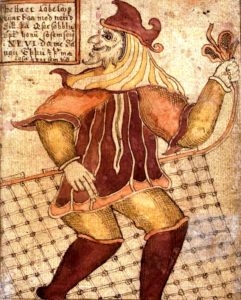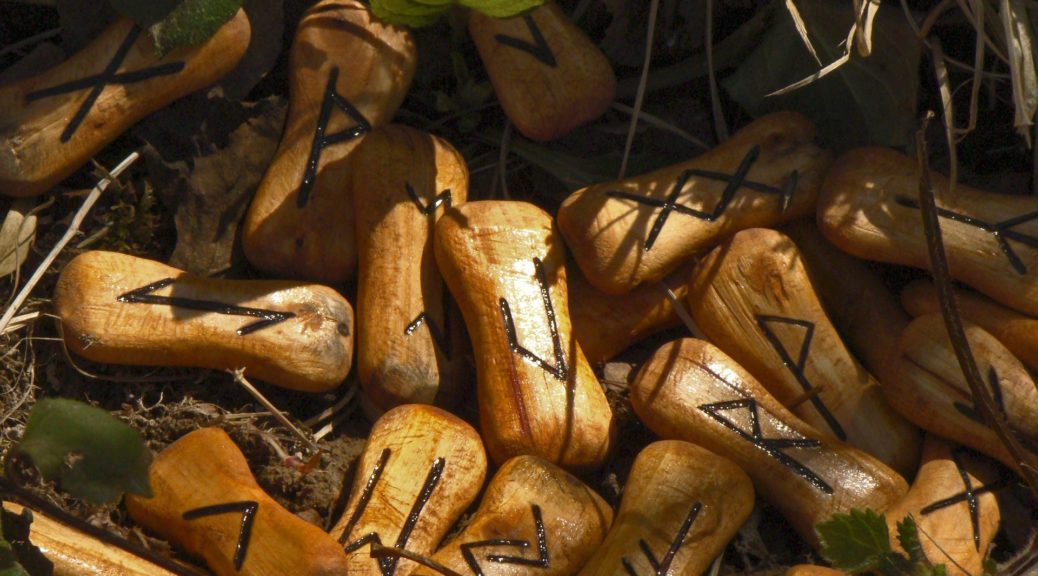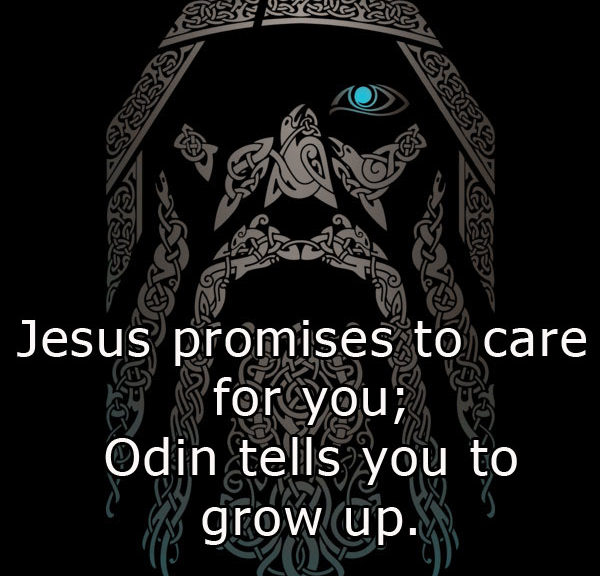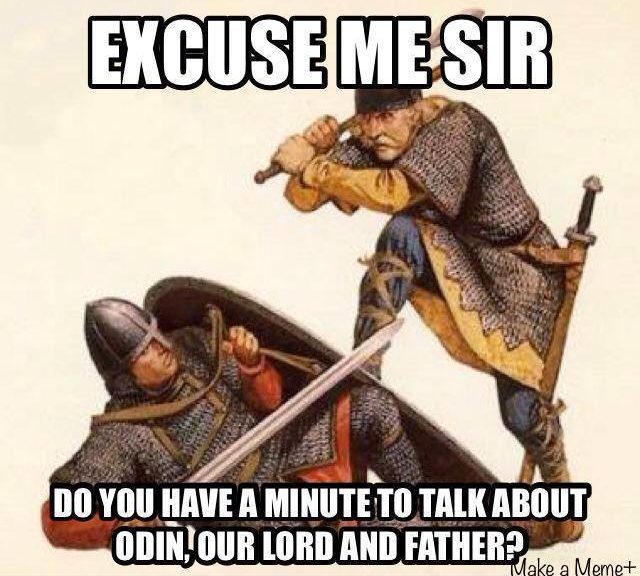Use Your Brain–and Listen to the Gods
One thing early on in my switch to Heathenism was my discovery that the gods actually had a lot to say to me. As a scientist, my first thought was: “Okay, I’m losing it.” After all, if you’re hearing voices, chances are you’re suffering from something like schizophrenia. That’s probably why my patron god eschews just popping into my brain unannounced. I’d just check myself into the local psychiatric clinic and be done with it. Which is why when I do get responses from the gods, it’s usually in some form I can accept and one that won’t leave me wondering if I need to check myself in for a thorough psychiatric evaluation.
This is premium content. You can subscribe HERE and log in HERE to view this content.
Get the Daily Pass for just 99 cents and read all the restricted content you want.
Yule Goat
Hope you all are having a good Yule! Since Yule runs 12 days — and why not make merry for 12 days? I thought I’d leave you with a little information concerning our friend, the Yule Goat. Since Odin has the Wild Hunt on Solstice, there’s no reason Thor can’t get into the act and have his goats bring presents.
Probably not his two goats, but you get the idea. Wikipedia has a nice article on it.
May the Yule Goat bring you many presents!
Happy Yule!
An Undercover Heathen around Christmas
If you’ve been following my blog, you know what I think regarding Christ. But you may not realize that I’m a bit of an undercover heathen, especially around Christian holidays. There are many reasons for this, most being convenience and a desire to not get into an argument with family members who will not change their minds.
Merry Christmas?
 Christmas is really a holiday appropriated from pagans. Rather than try to stop pagan Saturnalia, Solstice, and Yule celebrations, Christianity took the holiday and moved Christ’s supposed birthday to coincide with it. Originally Christmas was even banned in the American colonies because of the pagan origins. In fact, most of the Christmas celebrations we have now were instituted in the 19th century. Christmas trees were brought over from the Germans when Queen Victoria created Christmas in an image she wanted to see. Charles Dickens created a Christmas mythos in his novels. Basically what we have now wasn’t how Christmas was celebrated in the past.
Christmas is really a holiday appropriated from pagans. Rather than try to stop pagan Saturnalia, Solstice, and Yule celebrations, Christianity took the holiday and moved Christ’s supposed birthday to coincide with it. Originally Christmas was even banned in the American colonies because of the pagan origins. In fact, most of the Christmas celebrations we have now were instituted in the 19th century. Christmas trees were brought over from the Germans when Queen Victoria created Christmas in an image she wanted to see. Charles Dickens created a Christmas mythos in his novels. Basically what we have now wasn’t how Christmas was celebrated in the past.
The Feast of Yule
The Feast of Juul was pervasive in Scandinavian countries where the Yule log was lit to honor Thor. People lit bonfires to herald the return of the Sun, and those who celebrated welcomed the return of the sun as a symbol that Fimbulvetr, the long winter that preceded Ragnarok, had not come. People who gathered the ashes from the Yule log scattered them in the fields or used them for magic and medicine. In France, some folks kept the ashes under the bed to ward off lightning strikes.
Odin and the Wild Hunt
 The solstice was considered the closest time when the veil between the worlds was more thinly stretched. Odin would ride Sleipnir, accompanied by the dead during the Wild Hunt. Children would leave hay for Sleipnir in their boots, and in return Odin would leave them gifts. Hmm, sounds a bit like another old guy who leaves presents for children. I wonder if they’re related? (If you don’t get the sarcasm here, check out the link first.)
The solstice was considered the closest time when the veil between the worlds was more thinly stretched. Odin would ride Sleipnir, accompanied by the dead during the Wild Hunt. Children would leave hay for Sleipnir in their boots, and in return Odin would leave them gifts. Hmm, sounds a bit like another old guy who leaves presents for children. I wonder if they’re related? (If you don’t get the sarcasm here, check out the link first.)
Nowadays, Heathens recognize the twelve days of Yule starting with Solstice or Mother’s Night — the time of the year when our northern hemisphere is closest to the world of the dead. The shortest day of the year even feels magical. Especially up north, you’re more likely to see auroras, snow, and just a more magical landscape.
A Heathen in a Christian Land
For those of you who celebrate Yule, the season is indeed magical. For those of us whose families are mostly Christian, Christmas season can be wearing. I actually do love the trappings of Christmas, because, by golly, they’re Heathen with very little disguise. My thought is perhaps even though we do celebrate Christmas, it’s actually celebrating Yule, and maybe that’s all that counts. I certainly have a special celebration of the solstice as part of the festivities.

ol Yule book:
Pervasiveness of the Gods, or How Loki Tries to Take Me Off Point

My last blog was about trying to do too many things all the time. When I looked at it while it was still scheduled (I write these things ahead of time and set the date for publication), I realized that Loki led me off on a tangent again. This becomes infuriating after a while, but understandable. The trickster god is constantly looking for ways to throw my life into chaos — some good, some bad. And sometimes he’ll do it in a heartbeat when I’m trying to write a blog post.
This is premium content. You can subscribe HERE and log in HERE to view this content.
Get the Daily Pass for just 99 cents and read all the restricted content you want.
Do All The Things!
One thing I don’t seem to have gotten over very well is my Catholic need to martyr myself. (I can just see Tyr shake his head in exasperation when when I do this) — if the Lord of Swords thinks it’s folly to overextend myself, I suspect it is folly.
But the holidays are a great time to overdo everything, including overextend oneself. But as Loki constantly reminds me (and yes, somehow Loki pops in to remind me to self-care– more on that some other day), there’s no way I can possibly care for anyone else if I don’t care for myself first.
(At least, if you’re going to have psychoses, have useful ones where the gods talk some sense into you to do things that are good for you and those around you.)
Anyway, Back to the Holidays…
My mom used to put on a big shindig every Thanksgiving and Christmas. When my ancient Mother-In-Law moved to our town, I channeled my mom and tried to put together celebratory meals. The reality was far from wonderful. My husband and I hunt and hunting season chews up Thanksgiving handily. While I am grateful to Skadi and Ullr for our meals, hunting takes up a lot of energy. Having Thanksgiving later than the prescribed day helped, but by the end of it, I was channeling my inner bitch. I was exhausted, overworked, and feeling overwhelmed.
Loki reminded me to self-care.
I threw something at him.
Sick Critters, and Life Intrudes
To make matters worse, the weather got evilly cold. The Jotun were here to plunge us into temperatures below 0 degrees Fahrenheit. Skadi granted us more opportunities to hunt. A bunch of my livestock got sick and no matter what I did, they remained sick. So, I finally got a veterinarian out. Blood draws and plenty of medicine.
Then, there was the little matter of butchering the deer we got the week before. Usually I would have it all cut up, but with the amazingly brutal weather, the quarters froze right up. So, I could thaw them out and butcher them at a slightly more leisurely pace.
I still need to take care of the skins, even though they’re salted.
I have writing work and other work to do. My plants in the greenhouse are questionable now. I finally get around to watering them anyway.
Got a bunch of food  that needs to be preserved still. Managed to get the dehydrator full with squash.
that needs to be preserved still. Managed to get the dehydrator full with squash.
Loki reminds me to self-care.
I whimper.
I have this blog and three others to write. I have assignments to get done. I have to make money somehow…
To Drag this Back on Point…
The problem that we as humans deal with is what society constrains us when it comes to things we must do. Sometimes, we take what we perceive as obligations when in fact, they’re simply man-made constructs. We do things because we were taught to do them, whether or not it makes sense for our lives. As much as I love Tyr, he has enough control over my life with physics, the laws of nature, and the laws of men. Chasing after some perceived societal norm around holidays when it stresses me out isn’t healthy. Hence, Loki steps in and whines about my lack of self care.
That’s why when my husband pointed out that doing a dinner thing wasn’t working for me, I needed to step back and rethink what I was doing. I was trying to follow my mom’s style, which isn’t mine. Holidays, as wonderful as they are, need to be something that aren’t done “just because that’s how we do them.”
Whether celebrating Thanksgiving/Harvest or Yule/Christmas, we as humans must make them joyous occasions and not stressors in our lives. Loki reminds me that being human means being fallible. That means that sometimes we can’t do “all the things, all the time.” Tyr agrees. Which suddenly has reduced the stress in my life.
I still have all the other things to get done, but somehow, the gods make them a little less frenetic. Probably because they don’t judge me on what I accomplish in the minutiae of my daily life. Not like the Christian god purportedly did.
Thanks, and hopefully this rambling post made sense to you. And maybe, just maybe, you’ll listen to your inner Loki and remember self care as well.
Why Bad Things Happen: One Heathen’s Perspective
Bad things happen. When I look at things like the Paris attacks, I can’t help but wonder why. And as a former Christian turned Heathen, it’s easy for me to fall into the “why did god/the gods let this happen?” mode. The words, “shit happens” really does embody the Heathen and pagan view, so you’re probably going to get my rationale when it comes to this. Here is my perspective on why shit happens.
Christian God Versus Reality
You’ll see me talking about the Christian god quite a bit, because, quite frankly, as Americans, we deal with a Christian-pervasive society. While it is true that some folks have grown up without being in Christian family, I think most of us still have the Christian influences in our lives. Growing up in a Christian household, I was told to trust in god. That god had a plan. That god would take care of me. That everything would be okay.
If you’ve gone through some tough times, you know damn well that reality is never that cut and dry. That bad things happen to good people all the time and bad people do get away with things. Sometimes we see karma in action, but more often, we are left wondering how in the Hel we can pick up our lives and move on.
I can point to many instances of bad things happening to good people: children having cancer, tornadoes and hurricanes killing good people, and terrorist attacks. In many cases, the victims were Christians and perhaps very good people. The Christian god was asleep at the wheel on that day when bad things happened, otherwise, he wouldn’t have let it happen, assuming he was an all-powerful and benevolent deity.
Why the Gods Don’t Interfere — at Least Not Much
I personally believe that no god is truly all-powerful. Some are more powerful than others, which makes sense. But none of them are everywhere or paying attention to everything. My own patron god doesn’t always hang around my life because, quite frankly, it’s boring to him. Other gods may pop in and out as they will, but they aren’t with me all the time. Yep, sometimes I’m alone.
I went through some trying times and, quite frankly, got a little snotty with one of the gods for “abandoning” me. He showed up in a dream later and told me that he couldn’t prevent what happened. It was the Wyrd, and he thought it sucked too. But he did have some solace for me, which made me hesitate and think about the situation. In retrospect, he could’ve told me to fuck off and send me back to whatever I decided: Christian, Agnostic, or Atheist. But he didn’t. Instead, he sought to console me, which was surprising. At least to me.
Our Place in the Wyrd
 Basically, we’re all stuck with our Wyrd or fate. We like to think of ourselves as masters of our destiny, but even science says that free will may be an illusion. This sucks big time. The only thing that affects the universe is our choices, and depending on what we decide, our decisions spin off another universe. That’s amazing, if it doesn’t make your head hurt. We coexist in the past, present, and future, but we can’t perceive those times because of our limited, linear thinking. Or to quote the good Doctor:
Basically, we’re all stuck with our Wyrd or fate. We like to think of ourselves as masters of our destiny, but even science says that free will may be an illusion. This sucks big time. The only thing that affects the universe is our choices, and depending on what we decide, our decisions spin off another universe. That’s amazing, if it doesn’t make your head hurt. We coexist in the past, present, and future, but we can’t perceive those times because of our limited, linear thinking. Or to quote the good Doctor:
“People assume that time is a strict progression of cause to effect but actually from a non-linear, non-subjective viewpoint, it’s more like a big ball of wibbly wobbly, timey wimey stuff…”
Yeah, I just quoted Doctor Who. Get over it.
Basically, if you believe in physics and science, some things are just beyond even the gods. The Norns are possibly the only ones who handle our destinies, but even then, they just spin, measure, and cut. They don’t show us what the measure of our lives look like.
What’s more, we really don’t know what else is going on beyond our simple point of view. There may be something; there may be nothing. We just may be in the wrong place at the wrong time.
What to Take Away from All This
Bad things happen. Good things happen. Not everything that happens is something we want. Sometimes it happens for a reason. More often, it happens for no particular reason other than our choices, or no choices, or a single quantum flip. Sometimes the gods can help us; other times they can’t. That’s why in the end we have to deal with all the unfair things life throws at us, as well as all the good things. When we as Heathens understand that our destiny is due to our choices combined with quantum physics, we can finally understand the nature of the universe and the gods just a little better.
Can a Heathen follow Christ?
Oy! — did I step in this, or what? Today I had some Christian missionaries show up (I suspect Mormons) who wanted to talk with me about their god. When I said “no,” they wanted to leave materials with me. I told them “no” again. Basically I was annoyed as Hel because I was looking for deer to hunt and their presence did nothing other than scare critters away.
Deep Thoughts
But I had already started this post before they showed up, and I’ve been thinking about my Christian roots and also how some pagans and heathens are willing to keep the Christ in their lives. I believe strongly that while the intentions are good, this idea is at best misguided. Here is why I think you can’t be heathen and Christian. Come to think of it, I really don’t think you can be Christian and anything else.
Yes, yes, there are signs that in Iceland, for example, people mingled the two religions with the wolf cross, but I think it was more of a heathen hold out and not actual dual worship. As Iceland became more Christianized, having a Mjolnir that could be mistaken as a Christian cross was probably more for blending in than worshiping both the gods and the Christian god.
Basis of t he Abrahamic Religions
he Abrahamic Religions
It’s not that the Aesir and Vanir forbid worship of the Christ or the Abrahamic god. I suspect that if I had a discussion with my patron god about it, he would probably tell me that I could do whatever I wanted on that score, but the whole idea is kind of folly. The reason is simple: the god of the Abrahamic religions doesn’t want people to worship anything else. While I do not “worship” my Aesir and Vanir gods, per se, I do have a close relationship with them that I did not have with the Christian god. I will not abandon them because they do not abandon me. That is the definition of my relationship with my gods. Yours may be different.
I have plenty of proof to back up that the Abrahamic god does not suffer any other gods, and it is all in their bible. Old Testament or New Testament, it doesn’t matter. You worship other gods and you’re out. Just the statement in Deuteronomy 6:14 should give any pagan or heathen pause for thought:
“You shall fear only the LORD your God; and you shall worship Him and swear by His name. 14“You shall not follow other gods, any of the gods of the peoples who surround you, 15for the LORD your God in the midst of you is a jealous God; otherwise the anger of the LORD your God will be kindled against you, and He will wipe you off the face of the earth.…”
Well, okay then. The New Testament says similar things such as:
1 John 5:21
“Dear children, keep yourselves from idols.”
We know that Christians consider any other gods to be idols and not real gods, as though heathens worship the images they create and not the god whose image is supposed to suggest a likeness.
So if you’re a heathen, you’re worshiping demons in the eyes of their god. Another heathen wrote about the very same thing in this blog. So, if you’re really set on worshiping a god who hates your guts, despite your good intentions, that’s your business.
St. Boniface and Thor’s Oak
Perhaps the most telling of what Christians think of the heathen gods is demonstrated in the story about St. Boniface and Thor’s Oak. Boniface showed up in a town in Hesse and took an ax to the sacred tree. How much of the story is propaganda and how much is reality leaves much to conjecture. (For example, the Catholics claim that children were sacrificed to Thor.) Regardless, we do know that Boniface did take an ax to a sacred tree of Thor and built a church to St. Peter from the wood. Many sacred groves were destroyed because of Christians.
While I am in no way for something as heinous as human sacrifice, I do have to point out that history is often written by the victors. How much went on is probably exaggerated. Talk about sacrificing children and most rational people would say that the religion was evil that did it. But that is another topic for another time. My point with Thor’s Oak is that it shows what lengths Christians will go to to eliminate other gods. So, when you worship their god, you align yourself with those who would destroy your gods. Does that even make sense?
Did Christ Even Exist?
This is a sticky subject but one I’m willing to go out on a limb about. I suspect that Christ is a made up construct for the budding church. There were no written accounts of Jesus during the time he purportedly lived. The Gospels, even the earliest one, Mark, were written a hundred years or more after Christ’s purported birth. They contradict each other in terms of facts. What’s more, no pagan or writer contemporaries of Jesus Christ wrote about him. We can see that Tacitus was writing in the second century and not during the time of Jesus. Josephus wrote about Christ somewhere around 75 CE, but his work may actually be later work of Christians. This is all assuming that Josephus was even around during Christ’s life.
I can go on and on about this, but I think this is going to wait for another day when I feel like tackling it. All I can say is that if you do follow Christ and the Aesir and Vanir, perhaps I’ve given you something to think about.











